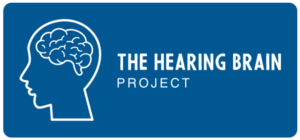The Hearing Brain Project
Dr Emma Holmes, Auditory Cognition Group
Wellcome Centre for Human Neuroimaging Digital Engagement Fund, £1000
In September 2020, Dr. Emma Holmes launched a series of focus group sessions to empower people with hearing difficulties to contribute to her research at the Wellcome Centre for Human Neuroimaging at UCL.
 The Hearing Brain Project aimed to develop an accessible animation for describing a new set of sounds. The animation was co-designed by researchers, a professional designer, and a focus group of people with self-reported hearing difficulties. The Auditory Cognition group at the Wellcome Centre for Human Neuroimaging regularly uses these types of sounds in their research, but they are artificial sounds and are therefore difficult to describe. Yet, they hold promise for assessing auditory grouping processes that are relevant to the ability to hear what someone’s saying when background noise is present.
The Hearing Brain Project aimed to develop an accessible animation for describing a new set of sounds. The animation was co-designed by researchers, a professional designer, and a focus group of people with self-reported hearing difficulties. The Auditory Cognition group at the Wellcome Centre for Human Neuroimaging regularly uses these types of sounds in their research, but they are artificial sounds and are therefore difficult to describe. Yet, they hold promise for assessing auditory grouping processes that are relevant to the ability to hear what someone’s saying when background noise is present.
Each focus group session took place online via a video call. We ran a series of 4 video calls over the space of 2 months. Five volunteers attended the sessions and contributed to the final animations, which were designed in an iterative process. Before each session, the designers provided some sketches that we shared with the group of volunteers. The volunteers provided feedback on the look and feel of the designs, which we incorporated into the next stage of the design process.
One of the volunteers said, “I found the experience interesting and helpful to me personally and I will start to read into the subject a bit”. Another commented, “It was interesting to hear how the sounds used changes of both frequency and time and reflecting about what made hearing difficult for me in some circumstances”.
Lead researcher Dr. Emma Holmes said, “We were delighted to use this opportunity to collaborate with people who report hearing difficulties. We were able to engage a diverse group of participants with different hearing histories, and it was a rewarding and enjoyable learning experience for everyone who was involved.”
“I learnt a lot about the volunteers’ experiences and strategies for listening in noisy places, how they think about their hearing differences, and how we might best be able to help them in the future.”
Dr. Emma Holmes has compiled the animations into a 3-minute video that explains the new sounds, which is publicly available on YouTube. She said, “The animations that we created will be extremely useful for describing our sounds to research volunteers and patients, and for disseminating our research more widely.”
The project was funded by the Centre’s Digital Engagement Grant in response to COVID-19. We would like to thank the volunteers who took part, and The Like Minded for bringing our ideas to life.
